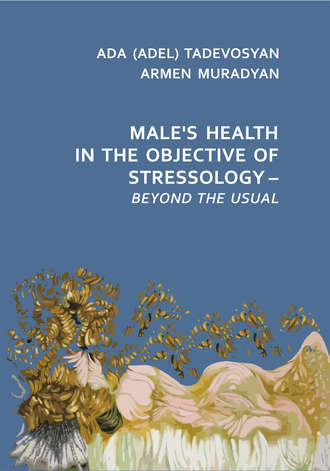
Полная версия
Male’s Health in the Objective of Stressology – Beyond the Usual
In the early school years the interest in “sexual games” slightly reduces despite the fact that children may have romantic feelings for peers. A new wave of increasing sexual interest is observed in the transitional age.
Recent advances in neuroscience confirmed Penfield’s metaphor on the predominant representation in the cortex of “mouth” and “motions” zones in the infant. These two zones stimulate the brain oscillatory activity as a necessary condition of its functioning and development. The kinetic zone and an arsenal of movements with all their seeming diversity are limited and in fact the same motor acts, functions are used to achieve very different effects. As a classical example can serve modern dances, during which the dancers reproduce a set of “sexual movements – dance-masturbation”. The man introduces himself into a trance, which generates sexual fantasies and experiences. Moreover, spectators also experience sexual arousal due to the presence of mirror neurons and the principle of intrusive memories. John Bancroft writes (1989) that sexual arousal in humans is a comprehensive response, consisting of such elements as sexual fantasies, memories and desires, as well as a growing conscious search for external stimuli, specific for the individual’s sexual orientation and sexual object. Bancroft believes that sexual arousal includes activation of the limbic system, which is the nerve substrate of sexual behavior from the point of view of physiology (MacLean, 1976).
In the culture of the 20th century “the principle of Ego” in relation to the social functioning of the human-male and human-female has gained strength and root; it is still in progress in the form of three global revolutions – sexual, gender and family (I. Kon, 2004, 2009, 2010; N. Amosov, 1978). The peak of the first of these revolutions – sexual, in the developed Western countries fell on 1960–1970-ies. Sexuality in the modern world has undergone significant changes due to the growing role of psychological and socio-cultural factors. Such a motif of sexual activity, as reproduction, receded into the background giving way to the need for sexual satisfaction, relaxation and communication. The reason is considered to be women’s emancipation.
However the behavioral shifts are associated with a deep process of separating sexuality from reproduction, which began long ago and gradually. Only recently the public consciousness of the West has recognized that sexuality itself is not aimed at procreation, needs no justification, it is valuable in itself. The sexual revolution of the 20th century in addition to the liberalization of mores and change in the forms of social control over sexuality involves the gradual assertion of the principle of gender equality. “Friends with benefits”, the film of the American cinematography of 2011, gave the researchers of sexuality a remarkable term of sexuality in the modern western world. Although the film is not about this, it is a comedy; but “sex with friends”, not committing to anything, not a result of the game of passions and love is more and more frequently used in the modern western world – had fun, discharged and ran away.
Конец ознакомительного фрагмента.
Текст предоставлен ООО «ЛитРес».
Прочитайте эту книгу целиком, купив полную легальную версию на ЛитРес.
Безопасно оплатить книгу можно банковской картой Visa, MasterCard, Maestro, со счета мобильного телефона, с платежного терминала, в салоне МТС или Связной, через PayPal, WebMoney, Яндекс.Деньги, QIWI Кошелек, бонусными картами или другим удобным Вам способом.
Примечания
1
With a feeling of deep gratitude we remember our patients. Communication and working with each of them enriched our experience. They left a particle of themselves in drawings that we used in this book. Patients’ names are not indicated here because of compliance with medical ethics.
2
Neuropsychology – the branch of psychology at the intersection of psychophysiology and neurology, studies the brain mechanisms of higher psychological processes (speech, thinking, perception, attention, memory) on the material of brain lesions and possibility of their recovery. – Editor’s note.
3
Cognitive means informative, mental, intellectual (from Lat. cogito – think, cognize). – Editor’s note.




